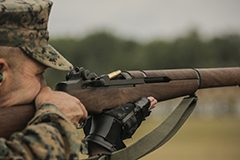M1 Garand Rifle
The M1 Garand is a .30-06 caliber semi-automatic rifle that was the standard U.S. service rifle during World War II and the Korean War and also saw limited service during the Vietnam War. Most M1 rifles were issued to U.S. forces, though many hundreds of thousands were also provided as foreign aid to American allies. The Garand is still used by drill teams and military honor guards. It is also widely used by civilians for hunting, target shooting, and as a military collectible.
 The M1 rifle was named after its Canadian-American designer, John Garand. It was the first standard-issue semi-automatic military rifle. By all accounts the M1 rifle served with distinction. General George S. Patton called it "the greatest battle implement ever devised". The M1 replaced the bolt action M1903 Springfield as the standard U.S. service rifle in the mid 1930s, and was itself replaced by the selective fire M14 rifle in the late 1950s.
The M1 rifle was named after its Canadian-American designer, John Garand. It was the first standard-issue semi-automatic military rifle. By all accounts the M1 rifle served with distinction. General George S. Patton called it "the greatest battle implement ever devised". The M1 replaced the bolt action M1903 Springfield as the standard U.S. service rifle in the mid 1930s, and was itself replaced by the selective fire M14 rifle in the late 1950s.
Although the name "Garand" is frequently pronounced /ɡəˈrænd/, the preferred pronunciation is /ˈɡærənd/ (to rhyme with errand), according to experts and people who knew John Garand, the weapon's designer. Frequently referred to as the "Garand" or "M1 Garand" by civilians, its official designation when it was the issue rifle in the U.S. Army and the U.S. Marine Corps was "U.S. Rifle, Caliber .30, M1" or just "M1" and Garand was not mentioned.
During World War II the M1 rifle's semiautomatic operation gave United States infantrymen a significant advantage in firepower and shot-to-shot recovery time over enemy infantrymen armed primarily with bolt-action rifles. The semi-automatic operation and reduced recoil allowed soldiers to fire 8 rounds as quickly as they could pull the trigger, without having to move their hands on the rifle and therefore disrupt their firing position and point of aim. The Garand's fire rate, in the hands of a trained soldier, averaged 40–50 accurate shots per minute at a range of 300 yards (270 m). "At ranges over 500 yards (460 m), a battlefield target is hard for the average rifleman to hit. Therefore, 500 yards (460 m) is considered the maximum effective range, even though the rifle is accurate at much greater ranges". More details
 The M1 rifle was named after its Canadian-American designer, John Garand. It was the first standard-issue semi-automatic military rifle. By all accounts the M1 rifle served with distinction. General George S. Patton called it "the greatest battle implement ever devised". The M1 replaced the bolt action M1903 Springfield as the standard U.S. service rifle in the mid 1930s, and was itself replaced by the selective fire M14 rifle in the late 1950s.
The M1 rifle was named after its Canadian-American designer, John Garand. It was the first standard-issue semi-automatic military rifle. By all accounts the M1 rifle served with distinction. General George S. Patton called it "the greatest battle implement ever devised". The M1 replaced the bolt action M1903 Springfield as the standard U.S. service rifle in the mid 1930s, and was itself replaced by the selective fire M14 rifle in the late 1950s.Although the name "Garand" is frequently pronounced /ɡəˈrænd/, the preferred pronunciation is /ˈɡærənd/ (to rhyme with errand), according to experts and people who knew John Garand, the weapon's designer. Frequently referred to as the "Garand" or "M1 Garand" by civilians, its official designation when it was the issue rifle in the U.S. Army and the U.S. Marine Corps was "U.S. Rifle, Caliber .30, M1" or just "M1" and Garand was not mentioned.
During World War II the M1 rifle's semiautomatic operation gave United States infantrymen a significant advantage in firepower and shot-to-shot recovery time over enemy infantrymen armed primarily with bolt-action rifles. The semi-automatic operation and reduced recoil allowed soldiers to fire 8 rounds as quickly as they could pull the trigger, without having to move their hands on the rifle and therefore disrupt their firing position and point of aim. The Garand's fire rate, in the hands of a trained soldier, averaged 40–50 accurate shots per minute at a range of 300 yards (270 m). "At ranges over 500 yards (460 m), a battlefield target is hard for the average rifleman to hit. Therefore, 500 yards (460 m) is considered the maximum effective range, even though the rifle is accurate at much greater ranges". More details
